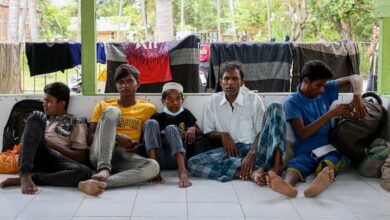The 5 knots that Chile’s new President Boric will have to untangle

By Sebastian Silva
Santiago, Mar 10 (EFE).- Managing the pandemic, the fragility of the economy, the political conflict in Araucania and the unprecedented immigration crisis are just some of the most pressing challenges that Chile’s new president, Gabriel Boric, will have to face.
Since February 2021, the police have tallied more than 50,000 illegal entries into Chile via unmanned border passes, a daily flow of hundreds of people.
The magnitude of this unprecedented migration into Chile and the rest of the Southern Cone, stemming from the Venezuelan exodus in which six million people have already left that country, has created an equally unprecedented humanitarian crisis in northern Chile.
It’s an unexpected challenge that is arousing discontent among the local population, causing a lack of basic goods and supplies for the people who are coming in and resulting in a militarization of the border.
Controlling illegal migration and establishing diplomatic bridges with neighboring countries affected by the crisis will be one of the most urgent challenges with which the new Chilean administration will have to grapple.
For decades, southern Chile has been mired in the so-called Mapuche Conflict, in which indigenous communities are facing off against big agricultural and forestry firms that are exploiting lands considered to be tribal by the country’s largest indigenous population.
It’s an area that has been forcefully occupied by the state since the end of the 19th century in a process known officially as the Pacification of the Araucania.
In recent years, with the frequent firebombing attacks of machinery and assorted properties, the conflict has intensified, resulting in the deaths of numerous Mapuches at the hands of agents of the state along with fatalities among the police and hunger strikes by indigenous prisoners.
On Oct. 12, 2021, President Sebastian Pinñera decreed a state of emergency that militarized the zone, a measure that Boric said he will not renew in favor of “calling for dialogue” among the parties.
The social explosion in late 2019, the biggest political crisis in Chile in three decades, unleashed a constitutional crisis unprecedented in the world that should lead in mid-2022 to the holding of a referendum to ratify a new constitution.
The text will replace the prevailing constitution, which was inherited from the 1973-1990 Augusto Pinochet dictatorship and is considered to be the origin of the country’s inequalities.
A large portion of the population has placed its hopes for change in a fairer model resulting from this process and thus the government has a vested interest in seeing it to a favorable conclusion, and that, too, is a major challenge for the incoming administration.
Last year was the fourth-driest year in Chile since records have been kept, a critical scenario where water scarcity has spread throughout the national territory but is affecting the central region most dramatically, where thousands of residents are receiving their drinking water each day via tanker trucks.
It’s a dire situation where the temperature just hasn’t stopped rising and last winter hit a high of almost 30 C (86 F).
There have been a total of 13 consecutive years of drought marked by scanty precipitation and a serious snowmelt deficit in mountainous areas.
Experts attribute the phenomenon to climate change, but ecological organizations say that Chile’s water management model – which originates with the neoliberal economy installed during the dictatorship – has aggravated it.
Increasing aid to small farmers and livestock raisers, preventing wildfires and guaranteeing an adequate supply of water will be priority tasks.
Chile, which suffered a significant plunge in its GDP of 5.8 percent in 2020 due to the coronavirus pandemic – the biggest drop in four decades – has staged a rapid economic recovery, but projections by the Central Bank for this year forecast no more than 2.5 percent growth.
With one of the world’s most open economies and despite the fact that neither Russia nor Ukraine are among its main trading partners, Chile’s position as a net importer makes it a country with vulnerabilities that are exacerbated by the war in Eastern Europe.





